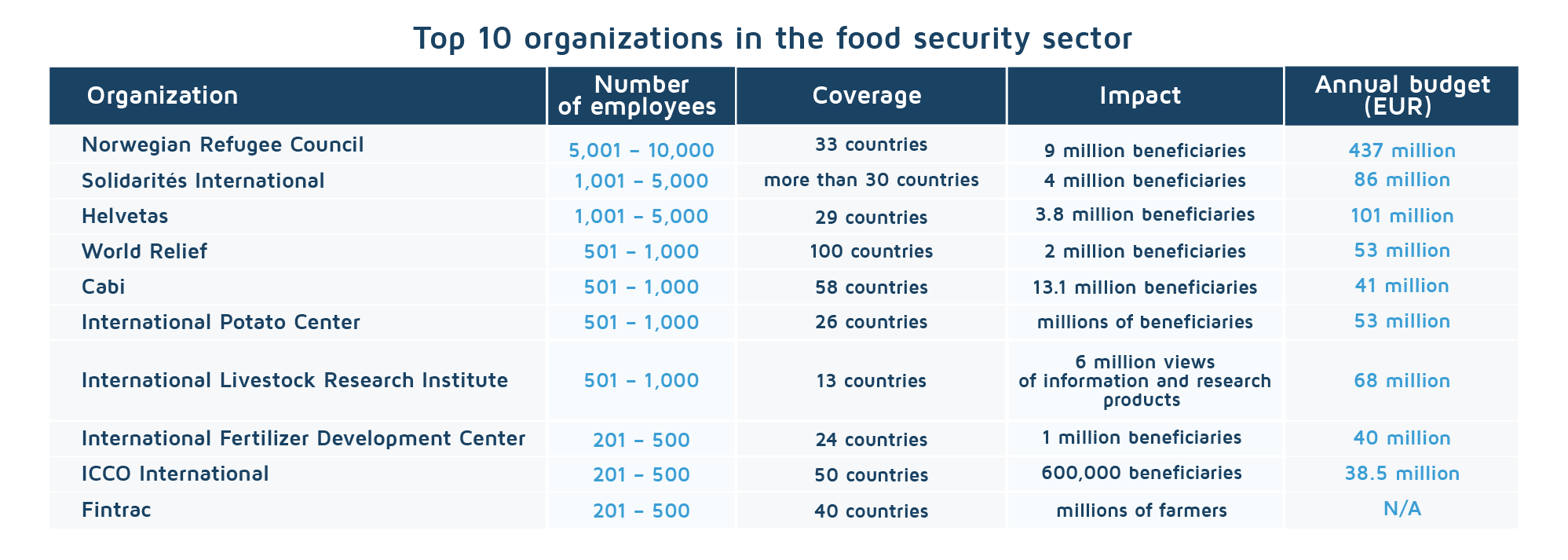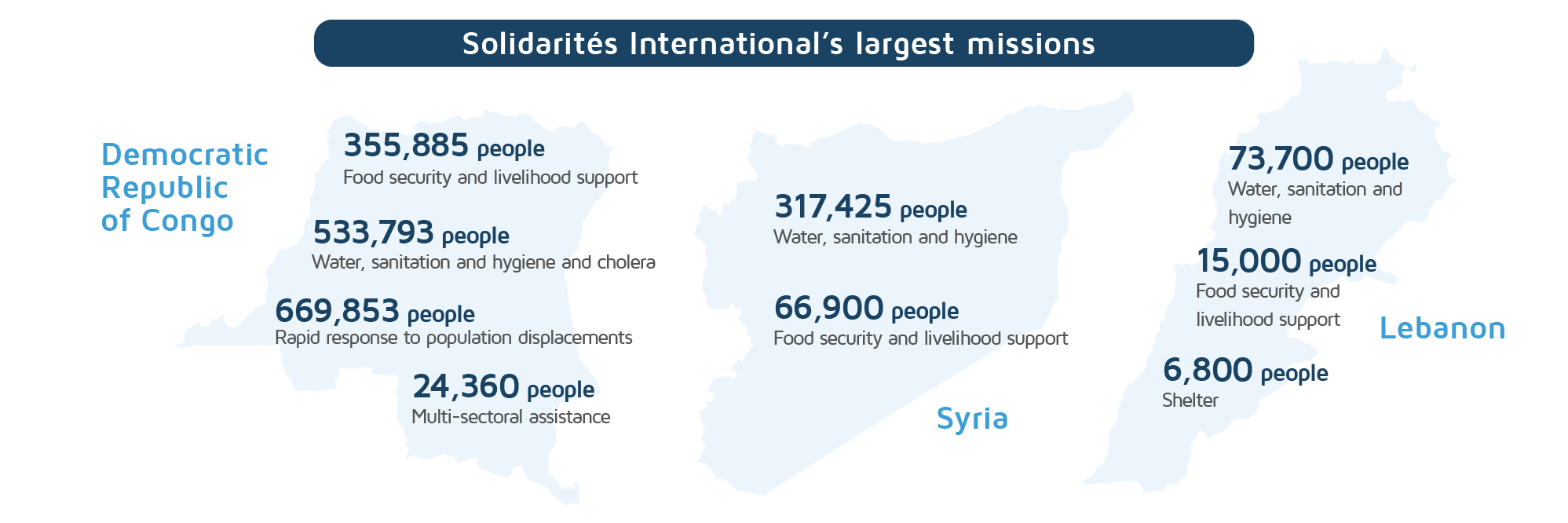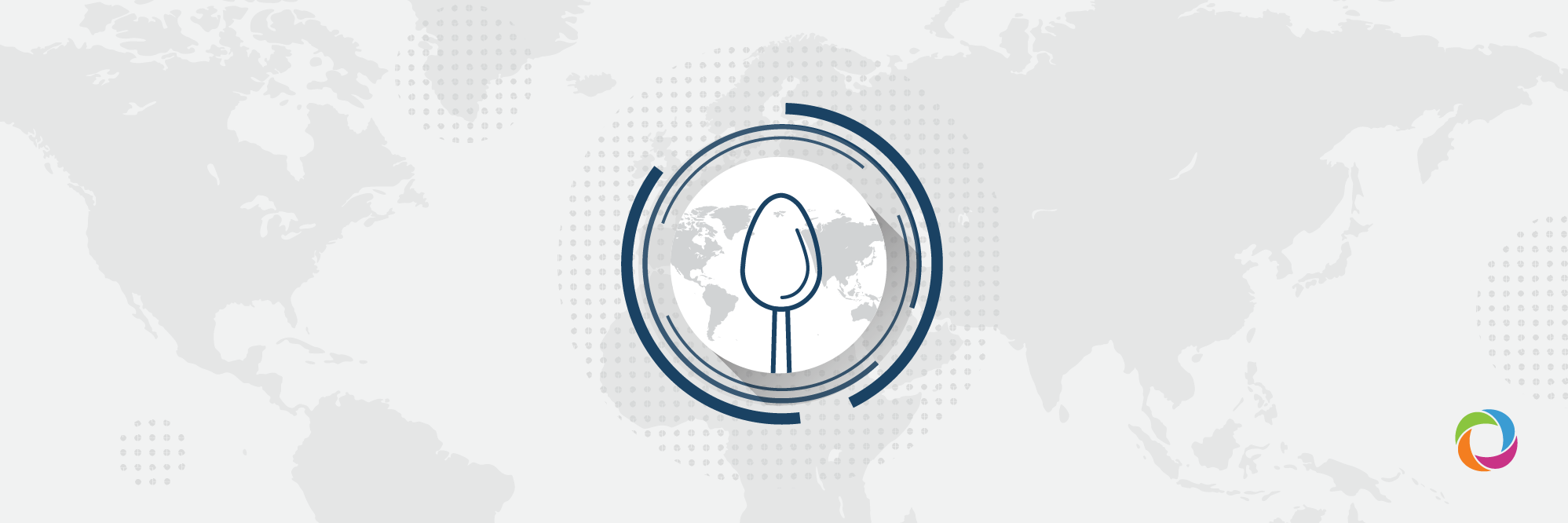The gloomy perspective of the worsening food crises that have trapped people in poverty and hunger is putting pressure on governments and the international community. Even before the pandemic, food insecurity rates had raised concerns but the realities over the intervening period accelerated the impetus to adopt concerted channeled sustainable actions. More people could die from lack of food linked to COVID-19 rather than from the disease itself before the end of the year.
DevelopmentAid gathers useful up-to-date information about the organizations engaged in finding solutions for challenges within the food security sector. Using the relevant information presented on our web platform combined with annual reports and other documents, we have identified the Top 10 organizations in the food security sector. The organizations have become involved in tackling the root causes of poverty and food crises by adopting a wide variety of programs and interventions.

The Norwegian Refugee Council (NRC), an independent humanitarian organization, has committed itself to protect the rights of displaced and vulnerable people during crises by providing humanitarian assistance and lasting solutions. Year by year, NRC has increased its capacity and financial resources in over 30 countries of the world to respond to emergencies. Committed to meeting people’s immediate needs, thousands of humanitarian workers provide food assistance and contribute to the rehabilitation of local food and market systems. The whole team is involved in promoting livelihood strategies that protect and strengthen the ability of individuals to earn a living.
In carrying out its humanitarian programs, the Solidarités International team has been concerned with supporting hundreds of thousands of people suffering from hunger, thirst, cold, disease, injury and neglect. Since its first mission in Afghanistan in 1980, the organization has expanded and diversified its humanitarian interventions, working in more than 30 countries worldwide to deliver assistance on the basis of people’s vital needs. According to its latest report, by intensifying its response program for displaced people, the Democratic Republic of Congo has become Solidarités International’s largest mission.

Helvetas, an international network of offices, is committed to reduce the impact of crises on the most vulnerable people and provide an appropriate emergency response. Almost 500,000 people gained access to drinking water and/or basic sanitation in 2019 with a total of more than EUR20 million being spent. Around 272,260 people were able to rely on emergency aid, either as refugees or following a natural disaster, while more than 1 million people benefited from sustainable and water-efficient agriculture, biodiversity, better commercialization of their farm products or balanced nutrition.
Given the unprecedented scale of displacement, violence, poverty and food crisis, World Relief offers a complex approach towards a lasting change. Each year, World Relief aids millions of the most vulnerable people around the world with 80% of those who directly benefit from the organization’s programs being women and children.

Determined to provide assistance tailored to people’s needs, Cabi’s interventions focus on issues such as climate change, equality, poverty, hunger, education and sustainability. Cabi’s specialists ensure access to scientific information, help farmers to grow more and lose less of their produce, contribute to boosting food security and reduce the reliance on harmful pesticides. The organization’s philosophy is grounded in the idea that individuals and organizations, countries and regions should work together to find answers and build sustainable livelihoods.
The International Potato Center (CIP), an international organization with a presence in more than 20 countries in Africa, Asia and Latin America, delivers innovative science-based solutions to enable access to affordable nutritious food, foster inclusive sustainable business and implement employment growth. Being a research-for-development organization with a focus on potatoes, sweet potatoes and Andean roots and tubers, CIP has supported almost 3 million potato farming households to produce more food and generate more income, while diversifying the diets of rural and urban consumers. 25% of potatoes grown in China, the world’s largest potato producer, are related to the CIP team’s involvement.
The International Livestock Research Institute (ILRI) is a research-for-development organization that focuses on creating a world free from poverty, hunger and environmental degradation. The organization’s research programs address many of the world’s most pressing sustainable development challenges, provide scientific evidence for decision-making, develop the capacities of stakeholders in the livestock-sector, find solutions that could reduce poverty and improve human health. During 2019, ILRI published 251 journal articles, 258 presentations, 196 book chapters and 58 briefs and brochures.
The substantial increase in food demand poses global problems that need to be addressed through the development and transfer of affordable, effective techniques. The International Fertilizer Development Center (IFDC) has delivered a wide range of research and development work, innovative fertilizer products and improved practices to sustain food security and agricultural productivity in over 100 developing countries. The work of the IFDC team focuses on strengthening the interaction between research, development and markets, stressing agriculture’s role in ending hunger and enhancing food production security.
The ICCO Cooperation is involved in development cooperation with a team that is engaged in strengthening the capacities of individual households to produce sufficient food, improving the production of farmer organizations and small and medium enterprises so they can support vulnerable people and ensuring access to markets, financial services and other inputs. Believing in a society without poverty, ICCO channels its efforts towards contributing to food secure, prosperous and resilient communities.

Providing agricultural solutions to end hunger and poverty, Fintrac is a US-based consulting company that has increased rural incomes and strengthened food security across Africa, Asia and Latin America. The Fintrac team has worked with local and global partners to increase production, to develop competitive value chains, to enable access to inputs and finance and to support the most vulnerable households. Over the last 28 years, they have improved the food security for more than 10 million people.
Fintrac, and many other organizations from the food security sector, have intensified their interventions to tackle the devastating effects of the COVID-19 pandemic which have worsened the hunger crisis throughout the world. Gain access to the DevelopmentAid database by becoming a member of our community. Subscribe to DevelopmentAid news and stay tuned in to all the up-to-date information.

